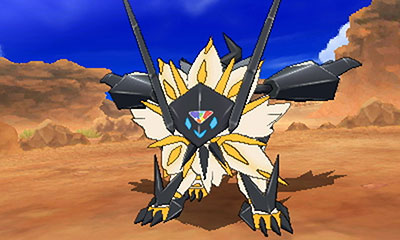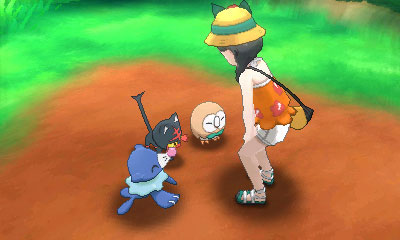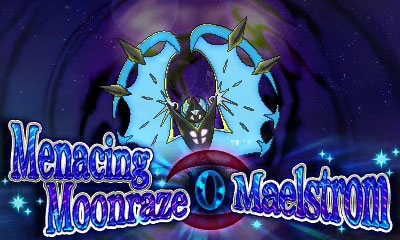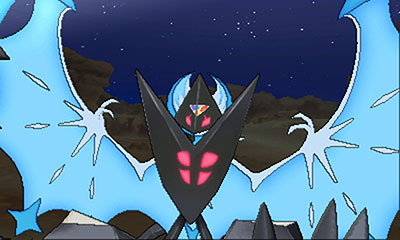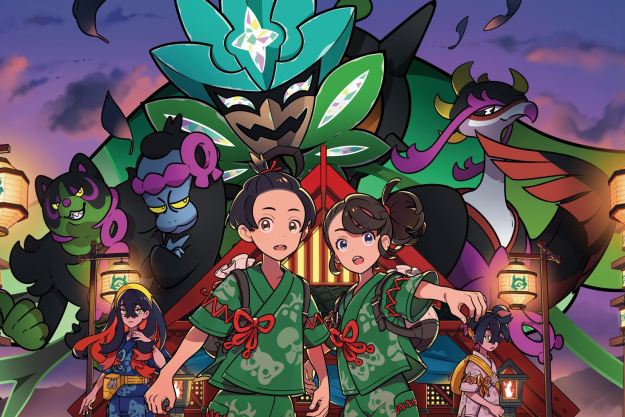In much the same way, Ultra Sun and Ultra Moon are the companions, or the director’s cut, of last year’s celestial-themed adventures. Aimed at Pokémon obsessives (like ourselves) and those that missed the games when they launched last year, this pair refines what was already a refreshing take on the Pokémon formula. The result is one of the most tightly paced, and rounded outings in the series, setting a new high watermark for the modern crop of children’s collect-a-thons.
Evil-Adjacent
Like most media for kids, Pokémon leans hard on convention and, more often than not, follows reductive morality. You, the innocent, starry-eyed adventurer, are a universal good. You exist in the game’s world to solve problems, to help others and to just be a swell person. Past games would drone on and on about caring for your Pokémon, about practicing, and developing the emotional connection between animal and human. But there were few, if any avenues to play that out.
Flash forward a couple decades and now Pokémon have grown to be almost Tamagotchi-like on their own. Sun and Moon included a system to groom and pamper your elemental animals, and encouraged players to work with the creatures outside of battles — caring for them in tangible ways. Ultra Sun and Moon take things a step farther by shifting not just how you treat those in your care, but how the whole game’s universe approaches morality.
Care and compassion are running themes. While older Pokémon games would often push through grueling strings of battles, specifically as a test of endurance. Your rivals here, though, heal you and your weary Pokémon up at just about every opportunity. The focus shifted away from the foreboding tenor of successive bouts to a friendlier air that encourages friendly competition over blood sport.
If you’ve taken a few years off, you’ll be surprised with how much Pokemon has come into its own.
Similarly, Team Skull (the apparent villains of both Sun & Moon as well their recuts), seem to be a tough-looking band of street thugs. They vandalize buildings, take over towns, and generally stir up a ruckus, but never with any explicit ill intent. As the game goes on, you learn that many of their ranks are packed with disillusioned youth desperate for a better life.
It’s notable, too, that the region of Alola, loosely based on Hawaii and other Pacific island nations, is intended to be a paradise. The sun shines almost daily, Pokémon and humans share the bounty of the tropics together, and everyone gets along fairly well — or at least that’s the hope.
The disaffected youth of Team Skull are anathema to that, though. They wreak havoc and chaos wherever they can. This isn’t out of malice, as is so common with villains in children’s media, but because they’re hungry and tired and homeless.
This was already a major plot point in Sun and Moon, but it gets some much-needed expansion by way of Ultra Sun and Moon’s longer narrative arcs and more detailed plot. Team Skull’s leader (and fan favorite), Guzma, gets plenty of added screen time to elaborate on his past and his motivations. It’s not Shakespeare, but it adds yet more depth to a franchise keen on growing up with much of its audience.

Here, evil isn’t something you are, it’s a tactic you use when all else has failed. And that through line of desperation or struggle in paradise is a powerful note to weave in.
New hair, don’t care
Just as the writing and story of Pokémon Ultra Sun and Moon has gotten quite a bit tighter, so too has the game benefitted from more than a few technical improvements. Just about everything here gets some minor tweak.
You can quick save now, for instance, saving you a few from delving into the menu each time you need to record your progress. You get plenty more customization options with which to dress your in-game avatar. They’re mostly minor touches, though, and aren’t really enough to compel fans of the vanilla Alola games to play the long and winding game again.
What might, though, are the addition of new Pokémon, in a manner of speaking. Solgaleo and Lunala, the twin headliners of Sun and Moon, have more powerful forms and sleek facelifts. Just about every legendary Pokémon from the entire series can be captured now, thanks to some otherworldly portals that begin appearing later on. In theory, this means that you should be able to polish of your collection of 807 monsters between the two games.
That puts Ultra Sun and Moon in the awkward spot of being a must-have for those who haven’t yet taken that fantastical trip to Alola, while garnering a pass for most everyone else.
Here, evil isn’t something you are, it’s a tactic you use when all else has failed.
Even with the more sympathetic look at trouble in paradise these releases offer, unless you were a big fan of Team Skull (like us) or are looking to live out the franchise’s “gotta catch ‘em all” maxim, you don’t need to come back just yet unless you’re already knee-deep in the Pokémon fandom.
If, however, you’ve taken a few years off the franchise as a whole, you’ll be pleasantly surprised with just how much this fad from the ‘90s has come into its own.
Editors' Recommendations
- Pokémon Sleep April Fools’ Day joke is surprisingly funny
- Pokémon Legends: Z-A: release date window, trailer, gameplay, and more
- Everything announced at February’s Pokémon Presents stream
- The Pokémon Company is investigating Palworld after plagiarism suspicions
- All Legendary Pokémon locations in Scarlet and Violet: The Indigo Disk
